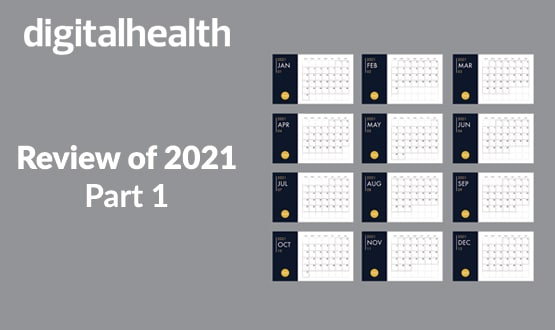Digital Health’s Review of 2021 part one: January to June
- 29 December 2021

After a whirlwind 2020, you might have thought 2021 would have been slightly calmer, however this was definitely not the case. The last year has seen momentum towards digital change across the NHS being sustained as well as the NHS App being thrust into the spotlight as Covid passports became a buzzword for 2021.
Away from the national headlines we also had the announcement of the controversial General Practice Data for Planning and Research (GPDPR) service and the then-health secretary, Matt Hancock, exclusively announcing the second wave of Digital Aspirants at Digital Health Rewired.
Join us as we take a look at some of the biggest stories on Digital Health in 2021, starting with January to June.

As the country sobered up from the not-so-normal festive period of 2020, Digital Health News reported on how a £75million tender for the provision of online and video consultations for the NHS had been published.
A tender notice revealed the NHS was looking for “suitably experienced and qualified” suppliers to join the Digital First, Online Consultation and Video Consultation (DFOCVC) Framework – which aims to deliver commitments in the NHS Long Term Plan to support online consultation in general practice.
January also saw Digital Health News exclusively reveal that County Durham and Darlington NHS Foundation Trust signed a 10-year deal with Cerner. The deal will see the trust deploy Cerner’s Millennium EPR solution after its board gave support to move forward with the contract.
The start of 2021 also saw the government pledging £7.5million to support electronic rostering systems for NHS staff as part of a £26million national fund to have all NHS doctors, nurses and other clinical staff on e-rostering systems.

The second month of 2021 saw technology being used to help clinicians identify new groups who could be at high risk of Covid-19. The risk prediction model, called QCovid, helped determine whether adults with a combination of risk factors may be at more serious risk from Covid-19, enabling them to be flagged to clinicians for priority access to vaccination, alongside appropriate advice and support.
However, NHS Digital had to later review the model after it incorrectly identified groups of women as needing to shield. The model flagged some women previously diagnosed with gestational diabetes as being at “high risk” of coronavirus on a “precautionary basis”.
February also saw a number of key health policy documents being leaked which revealed plans which would see legislature introduced to ensure every part of England would be covered by an Integrated Care System (ICS) in a bid to ensure more joined-up care, better integration, and reduced bureaucracy.
In sadder news, February saw the passing of the first National Data Guardian (NDG) for Health and Social Care, Dame Fiona Caldicott. Dame Fiona was appointed to the office of the National Data Guardian in November 2014 and was confirmed as the first statutory holder of the position in April 2019. Colleagues later paid tribute to the “wise” and “passionate” 80-year-old.

There was lots of movements and appointments in March as Dr Timothy Ferris was revealed as the director of transformation at NHS England and Improvement while just days later, NHS Digital’s CEO, Sarah Wilkinson announced she would be stepping down from the role.
March also saw the return of Digital Health Rewired, where the then-health secretary, Matt Hancock, exclusively revealed the second wave of Digital Aspirant trusts and also told the virtual audience that he was looking at creating “a consistent data platform” which would see patient data separated from the application layer.
Attendees also witnessed Peppy Health being crowned the winner of Digital Health Rewired Pitchfest 2021.

April saw the first mutterings of something called a ‘Covid-19 passport’ as it was confirmed they would be available via the NHS App and could be used for travel overseas. The government confirmed on Sky News that the app will be used as proof Brits have had their Covid-19 vaccination, or tested negative for the virus, before going on holiday.
In business news, the Dedalus Group completed its acquisition of DXC Technology, in a deal believed to be worth around £350million ($450million).
It wasn’t a good month for Microsoft after it suffered a global outage which means Teams and many other services went down for several hours. The issue was first reported in Europe and Asia, but was soon confirmed to be affecting customers globally. Microsoft confirmed the cause of the issue had been identified and work is underway to fix it.

The Covid-19 passport theme continued in May as the government confirmed they would come into force on May 17 with travellers able to access their vaccination status through the NHS App.
Away from Covid-19, May also saw NHS Digital announcing it was setting up a controversial new primary care data collection service – saying the aim was to give planners and researchers faster access to pseudonymised patient information.
According to NHS Digital, under the new service, known as General Practice Data for Planning and Research (GPDPR), data would only be shared with organisations who have a legal basis and meet strict criteria to use the information for local, regional and national planning, policy development, commissioning, public health and research purposes.
May also saw health services in the Republic of Ireland having to be switched off following a “significant ransomware attack”. The Health Service Executive, which provides public health and social care services to everyone living in Ireland, tweeted on 14 May to say it had shut down all of its IT systems as a “precaution” and to “protect” health systems from the attack.

As we hit the middle of the year, the news continued to filter in as NHS Digital confirmed that the implementation date for GPDPR would be moved from July to September after a number of people aired their concerns. This included whether enough time has been given to inform patients about the changes which could result in patient trust being “destroyed”. Therefore, NHS Digital has said that to ensure that more time is allocated to speak with patients, doctors, health charities and others to strengthen the plan even further, the collection of GP data for planning and research in England would be deferred from 1 July to 1 September 2021.
June also saw Babylon announcing plans to become a public company following a $4.2bn (£2.9bn) merger. The company revealed it had entered into a definitive merger agreement with special purpose acquisition company Alkuri Global with US big data company Palantir also taking a strategic stake in Babylon.
Elsewhere, Digital Health News also reported on how a former IT manager of an NHS trust pleaded guilty to defrauding his employer of more than £800,000. Barry David Stannard, of Chelmsford in Essex, pleaded guilty to four offences at Chelmsford Crown Court on May 26, including two charges of fraud by false representation and two charges of cheating the public revenue.
And last, but by no means least, at the end of June we saw a new health secretary appointed after Matt Hancock resigned over an affair with his aide. Former chancellor Sajid Javid was brought in, who the British Medical Association (BMA) said had a “huge and urgent task ahead”.




